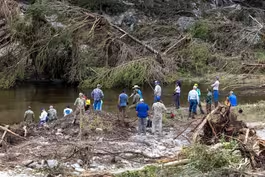
Malaysia stops accepting plastic waste from rich nations
Clip: 7/20/2025 | 4m 27sVideo has Closed Captions
Malaysia stops accepting plastic waste from the U.S. and other rich nations
The U.S. produces more plastic waste than any other country in the world. Last year, more than 35,000 tons of it was shipped to Malaysia, which received more discarded plastic from rich nations than any other developing country. But in June, Malaysian leaders effectively banned future shipments. John Yang speaks with Anja Brandon, director of plastics policy at Ocean Conservancy, to learn more.
Problems playing video? | Closed Captioning Feedback
Problems playing video? | Closed Captioning Feedback
Major corporate funding for the PBS News Hour is provided by BDO, BNSF, Consumer Cellular, American Cruise Lines, and Raymond James. Funding for the PBS NewsHour Weekend is provided by...

Malaysia stops accepting plastic waste from rich nations
Clip: 7/20/2025 | 4m 27sVideo has Closed Captions
The U.S. produces more plastic waste than any other country in the world. Last year, more than 35,000 tons of it was shipped to Malaysia, which received more discarded plastic from rich nations than any other developing country. But in June, Malaysian leaders effectively banned future shipments. John Yang speaks with Anja Brandon, director of plastics policy at Ocean Conservancy, to learn more.
Problems playing video? | Closed Captioning Feedback
How to Watch PBS News Hour
PBS News Hour is available to stream on pbs.org and the free PBS App, available on iPhone, Apple TV, Android TV, Android smartphones, Amazon Fire TV, Amazon Fire Tablet, Roku, Samsung Smart TV, and Vizio.
Providing Support for PBS.org
Learn Moreabout PBS online sponsorshipJOHN YANG: The United States produces more plastic waste than any other country in the world.
Hundreds of tons person.
About 90 percent of it ends up in landfills, is burned or shipped overseas.
Last year, more than 35,000 tons of it was shipped to Malaysia.
Malaysia received more discarded plastic from rich nations than any other developing country.
But last month, Malaysian leaders effectively banned future shipments.
Anja Brandon is director of Plastics Policy for the Ocean Conservancy.
Anya, why are these rich nations like the United States shipping plastic waste to countries like Malaysia?
ANJA BRANDON, Ocean Conservancy: Yeah, it's a great question.
Honestly, there's two big factors.
One, we are simply making too much waste here at home to handle ourselves.
You already said we are the number one generator of plastic waste worldwide.
The average American generates something like 200 pounds of plastic waste each and every year.
And the second big reason is it is just cheaper to send it overseas than trying to deal with it here ourselves.
This sort of has led to our out of sight, out of mind approach, which is becoming painfully clear now that these other countries are no longer accepting our waste.
JOHN YANG: And what were these countries or what are these countries doing with all of this?
ANJA BRANDON: Well, they try to recover and recycle what they can, but we know the sheer volume of what we are sending there and what other countries are sending there can make that all but impossible.
Which means That a lot of this waste ends up landfilled, illegally dumped, burned, or unfortunately ending up getting out into the environment and ultimately into our ocean.
JOHN YANG: And is that essentially why Malaysia is saying no more?
ANJA BRANDON: Exactly.
Malaysia is joining a whole host of other countries that really started with China a few years ago, standing up to the United States and other countries and saying no more.
We do not want to keep being your dumping ground and accepting your waste and really holding the United States accountable for our own pollution.
JOHN YANG: Some people will say that this is a problem of what to do with the waste.
But isn't the real problem generating the waste?
ANJA BRANDON: It's both.
Right.
We absolutely need to make less waste, which really starts with making less plastics in the first place.
And the second is what we do with it.
There's this saying that all waste is local, which really means how you manage your waste should be local.
That's how we get to those closed circular systems where things don't end up out in our environment.
And really it's our local governments and our state governments right now that are quite literally left holding the bags of trash and recycling that we can no longer send overseas.
So it's those local and state governments that are really stepping up to take this issue head on.
Whether that's by passing policies to require less plastics or to, you know, hold plastic producers accountable for helping fund this new recycling and waste management program that we need.
JOHN YANG: Obviously at the Ocean Conservancy, you spend a lot of time looking at the effect of this on plastic waste in the oceans.
Tell us how big that problem is and how much the United States contributes to it.
ANJA BRANDON: Yeah, I mean, I think we all know that plastics in the ocean are a big problem, but it's hard to just wrap our minds around truly how big of an issue this is.
Each and every year, 11 million metric tons of plastics enter our ocean from land based sources alone.
That's over a garbage truck's worth of plastic entering our ocean every single minute.
That's plastic that ends up in our ocean smothering corals, entangling birds and being ingested by whales.
There's really no place in our ocean that has been left untouched by plastic pollution.
And that's not only bad news for the ocean, that's bad news for us.
We rely on a healthy ocean.
We're dependent on it.
Our ocean is responsible for every other breath we take.
Seafood we eat, places we go and play and enjoy.
If our ocean is struggling, we are going to struggle too.
JOHN YANG: Anja Brandon of the Ocean Conservancy, thank you very much.
ANJA BRANDON: Thank you.
Flint removes thousands of lead pipes, but problems remain
Video has Closed Captions
Clip: 7/20/2025 | 5m 21s | Flint removes thousands of lead pipes in major milestone, but these problems remain (5m 21s)
News Wrap: Number of missing from Texas floods drops to 3
Video has Closed Captions
Clip: 7/20/2025 | 2m 26s | News Wrap: Number of missing from Texas floods drops to 3 people (2m 26s)
Palestinians describe risking death to get food aid in Gaza
Video has Closed Captions
Clip: 7/20/2025 | 6m 23s | Palestinians describe choice between starvation and risking death to get food aid in Gaza (6m 23s)
What to know about mental health misinformation online
Video has Closed Captions
Clip: 7/20/2025 | 4m 51s | What to know about the rise of mental health misinformation on social media (4m 51s)
Providing Support for PBS.org
Learn Moreabout PBS online sponsorshipSupport for PBS provided by:
Major corporate funding for the PBS News Hour is provided by BDO, BNSF, Consumer Cellular, American Cruise Lines, and Raymond James. Funding for the PBS NewsHour Weekend is provided by...















